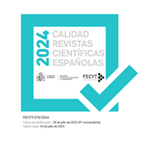Spanish language teachers’ pedagogical beliefs in Chinese universities
Resumen
Understanding teachers’ beliefs is critical to improving educational practice. There is a significant need for research on foreign language teachers’ pedagogical beliefs, as these can exert an influence on students’ learning outcomes. This study draws on Kember’s (1997) theorization of teaching beliefs to explore the beliefs of Spanish language teachers regarding their pedagogy in Chinese universities. Twenty teachers from the Spanish departments in eight Chinese universities were recruited as participants, and a Q-methodology analysis with supplementary interview data identified three types of pedagogical beliefs: “integrated capacity-building”, “ELE learning outcome-focused”, and “social interaction-focused”. The findings suggest that ELE teachers in China no longer subscribe to the traditional teaching methodology which places themselves at the class center, and have instead progressed along a continuum from teacher-centeredness to student-centeredness. With a novel focus on Spanish teachers’ beliefs in Chinese universities, this study provides insights into the teaching of languages other than English (LOTEs) in China, and helps to expand the methodological repertoire in the field of linguistic research.
Descargas
Descarga artículo
Licencia
La revista Círculo de Lingüística Aplicada a la Comunicación, para fomentar el intercambio global del conocimiento, facilita el acceso sin restricciones a sus contenidos desde el momento de su publicación en la presente edición electrónica, y por eso es una revista de acceso abierto. Los originales publicados en esta revista son propiedad de la Universidad Complutense de Madrid y es obligatorio citar su procedencia en cualquier reproducción total o parcial. Todos los contenidos se distribuyen bajo una licencia de uso y distribución Creative Commons Reconocimiento 4.0 (CC BY 4.0). Esta circunstancia ha de hacerse constar expresamente de esta forma cuando sea necesario. Puede consultar la versión informativa y el texto legal de la licencia.











